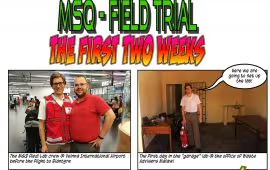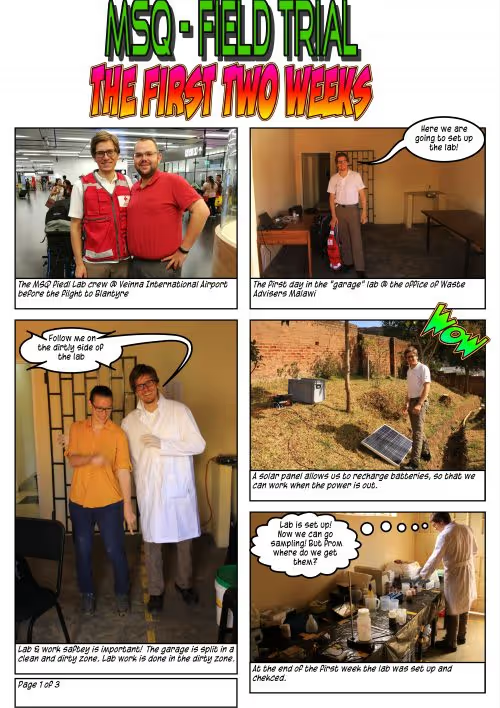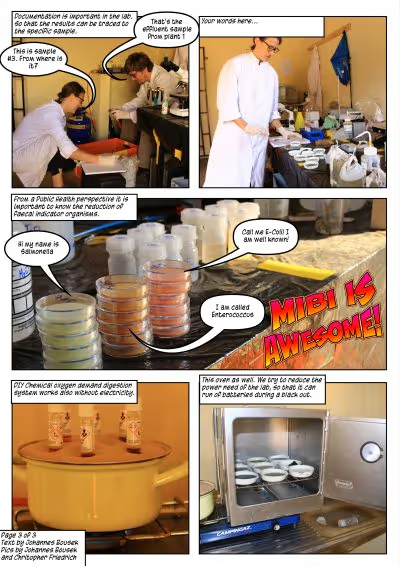Welcome to Malawi – the first two weeks

The first two weeks of the MSQ Field trial are complete! Wow, time passes quickly when you are having fun in a lab! Below is a short summary of what we did.

Late in the evening of Friday, August 4th I met with Christopher Friedrich, Austrian Red Cross, at Vienna International Airport to board the air plane which took us to Blantyre, Malawi. For those who do not know, Malawi is a land locked country in sub-Saharan Africa. Its neighbours are Mozambique, Tanzania, and Zambia.
Christopher is a WASH volunteer in the Austrian Red Cross. He is a part of the Austrian Red Cross WASH Emergency Response Units and has been deployed before to Bosnia and Herzegovina to run a water testing field lab. Currently, he is finishing his master’s degree in “Environmental Science in Europe” (a joint program of SLU, Sweden and Boku). Thus, he is a perfect fit for the field trial as he is experienced in field lab work and still new to the project so we can estimate training needs.
We arrived on Saturday afternoon at Blantyre airport and were picked up by Grover from Waste Advisers Malawi. We visited the office and checked the equipment of the field lab. The field lab arrived in good order prior to us at the Waste office in Blantyre. Afterwards, we went to sleep in our guesthouse.
The following Monday we started to set up the lab in the garage of the office. The garage was refurbished especially for us and is a good fit for the lab (paved floor, water tab and sink and a small storage area). The lab set up and procurement of last supplies was finished on Wednesday and the first sample (septic tank of the office) was taken on Thursday.
On Wednesday, we also met with Elizabeth Tilley from the University of Malawi, the Polytechnic, to discuss the collaboration between the MSQ field lab and the Polytechnic. Their lab will act as reference to check if the results produced by the MSQ field lab are correct. A master student of the Polytechnic started working with us. His master thesis will be on the lab and the comparison between two different onsite sanitation systems. He started his training with us on Monday of the second week.
On the first weekend and for the second week, Magdalena Bäuerl from the Austrian Red Cross WatSan Service Center joined the field trial. She has a lot of experience in the African sanitation sector and helped us in the lab and in the strategic transition of the prototype into a product.
During the second week, we went on a field trip to visit and assess possible sampling sites. We went to two wastewater treatment plants of Blantyre and a faecal sludge dumping site. The MSQ field lab was designed to provide process control for and necessary public health information of the effluent of wastewater/faecal sludge treatment plants. A fourth sampling site, an anaerobic digester, at a school was visited and sampled during a different trip. All four, different plants use different processes for the treatment of wastewater or faecal sludge. This allows us to test the lab broader spectrum. We have started to sample the treatment plants and will do that repeatedly for the rest of the field trial.
Other support equipment, solar panel, and batteries, are tested on a daily basis, due to regular load shedding. Until now the field lab with its support equipment worked very well. In the middle of the second week we were joined by Jan Spit from Waste, who will also stay for a week with the field trial.


Results first week:
• Lab set up completed
• Purchase of missing equipment
• All equipment checked and calibrated
• Familiarization of Christopher with field lab methods
• Samples from septic tank analysed
Results second week
• Field trip to visit possible sampling sites
• First sampling round
• Training of master student
• Analysis of first samples
We'd like to thank the people from Waste for their great support. Especially Grover and Wilfried!
Author: Johannes Bousek, University of Natural Resources and Life Sciences, Vienna
Stay updated
Sign up for our newsletter to receive regular updates on resources, news, and insights like this. Don’t miss out on important information that can help you stay informed and engaged.
Explore Elrha
Learn more about our mission, the organisations we support, and the resources we provide to drive research and innovation in humanitarian response.


.png)